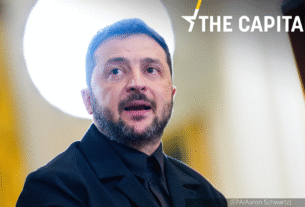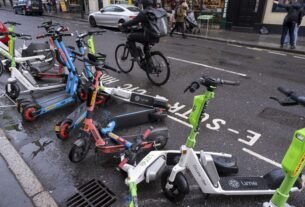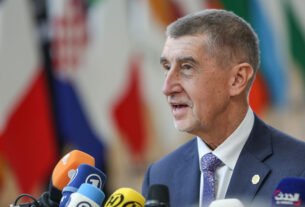Good morning, and welcome to The Capitals. Brussels is still dozing through the final days of summer, with the real rentrée yet to arrive. For now, the political action is playing out a little further south.
This is Eddy Wax, joined by Nicoletta Ionta. Have a tip or story idea? Reach us by email – or, for the more discreet, on Signal: @EddyWax.94
In the capital
François Bayrou, France’s latest prime minister, has gambled his survival on a confidence vote, daring lawmakers to embrace his austerity budget or topple his minority government after just eight months in power. Defeat would prolong the political turbulence unleashed when President Emmanuel Macron called snap elections last June.
At a press conference on Monday, Bayrou, a centrist veteran, announced the 8 September parliamentary vote and laid out the case for his unpopular €44 billion budget squeeze. Public debt, he warned, which has soared to 114% of gross domestic product at €3.4 trillion, poses an existential threat.
Calling the vote is the only way to communicate the scale of that risk to citizens, Bayrou said, likening France’s dependence on creditors to a form of military occupation. At 5.8% of GDP, the country’s annual deficit last year was the worst in the eurozone and almost double the official EU limit of 3%. In interest alone, France is expected to pay about €53 billion this year, more than its military spending.
Investors share Bayrou’s alarm. France is now borrowing at higher rates than many of its European peers; even Greece, once crippled by the eurozone crisis, has been financing itself more cheaply. Only Italy pays more, and that could soon change, according to reports.
Bayrou’s proposal to slash two public holidays had already triggered calls for a national strike. He did not make any concessions during his press conference but signalled that the plan is up for debate and amendment. The “supreme risk is to do nothing,” Bayrou said, pleading for the focus to remain on the debt itself.
Yet, predictably, the focus quickly shifted to Bayrou’s survival, parliamentary arithmetic, and whether his wager might hasten the rise of Marine Le Pen’s far-right National Rally. “Perhaps the real presidential campaign started today,” quipped former Commissioner Thierry Breton on TV channel LCI last night. (Macron will not be unseated by the vote but it could further weaken him).
The National Rally swiftly declared it would not vote for the government, as did the far-left France Unbowed and the Socialists. Bayrou needs an absolute majority of votes cast, meaning abstentions could tip the balance.
That is a slightly easier path than the one faced by Bayrou’s predecessor, Michel Barnier, whose government fell over the same issue in 2024. The game for Bayrou is now to convince individual centre-left or National Rally MPs to abstain rather than vote against him.
Just two days after Bayrou’s do-or-die confidence vote, Commission chief Ursula von der Leyen will deliver her State of the Union address in the French city of Strasbourg on 10 September, during which she might underscore the broader stakes.
Europe’s debt-fuelled welfare model is creaking. Even Germany, with a debt-to-GDP ratio half that of France, is pushing to slash more than €30 billion from its 2027 budget to offset new defence and infrastructure costs. The continent is drifting back to austerity, with populism likely to follow.
Meanwhile in Athens, the ghosts of Europe’s last austerity era are beginning to walk again…
… Former PM Alexis Tsipras, who steered Greece through its own debt crisis, is flirting with a return to politics. With PM Kyriakos Mitsotakis under pressure at home and abroad, some see an opening. But Tsipras shouldn’t expect a red-carpet welcome, my colleague Sarantis Michalopoulos writes here.
Poland moves to restrict benefits for Ukrainian refugees
President Karol Nawrocki, a hardline nationalist elected in June, refused to sign a measure that would have extended support for Ukrainian refugees until March 2026.
Nearly 1 million Ukrainians currently benefit from temporary protection in Poland. That generosity has gone too far, Nawrocki said, “I do not consent to a situation in which the citizens of the Polish state are treated worse than our guests from Ukraine. Poland first, Poles first!”
He vowed to tighten access to welfare and healthcare, such as the flagship “800+” child allowance, a monthly payment of less than €200 per child introduced by PiS and maintained by Donald Tusk’s government, which also covers Ukrainian refugees. Nawrocki wants Ukrainians to qualify only if employed, echoing earlier PiS proposals to curb access.
Metsola: ‘Europe is not a spectator’
Today, European Parliament President Roberta Metsola will address the Rimini Meeting, an annual Catholic-inspired gathering of Italy’s political and business elite.
Mario Draghi issued a scathing critique of the EU at the same forum last week, in which the former ECB chief accused the continent of simply watching from the sidelines while others shape the outcome of geopolitical conflict. The Capitals got a sneak peek of Metsola’s speech, and she is preparing to strike a defiant chord.
“Europe is not a spectator. It has never been one, and it must never become one,” she will say. “Europe has always found the strength to lead, to act and to defend what’s right.”
“Security, competitiveness, simplification, integration – these are not just buzzwords. They are the building blocks to Europe’s next chapter.”
President of Europe? Just ask Trump
Donald Trump claimed on Monday that EU leaders have “jokingly” referred to him as “the president of Europe.”
“They call me the president of Europe. Which is an honour. I like Europe. And I like those people. They’re good people. They’re great leaders,” the US president told reporters in the Oval Office. The European Commission, with its usual restraint, declined to comment.
Whether this is more embarrassing than NATO Secretary-General Mark Rutte calling Trump “daddy” is open to interpretation. What’s clearer is that Europe has mastered the art of stroking the ego of a man deeply susceptible to flattery.
But the warmth lasted only a few hours before Trump was back in combat mode, threatening “substantial” tariffs against countries with digital taxes or content rules in a post on Truth Social. His administration has long cast the EU’s Digital Services Act as both censorship and an unfair burden on US companies.
The capitals
BERLIN
Germany’s former vice-chancellor Robert Habeck will leave parliament on 1 September to take up academic posts in Copenhagen and California, marking his exit from frontline politics. Defeated in his February bid for the chancellery, the Greens politician said it was “time to close one door so that another can open.”
ROME
Italy clawed back 17.7% of the €72.3 billion lost to tax evasion in 2024, according to a report released by the Court of Auditors. With just 1.4% of businesses and professionals audited annually, the watchdog pointed to lax enforcement and warned that repeated amnesties have deepened rather than discouraged a culture of tax evasion. The findings appear at odds with the government’s April claim of unprecedented success in tackling the issue.
MADRID
Spain’s opposition leader, Alberto Núñez Feijóo, has proposed a wildfire plan that includes a national arsonist register, a measure that has no precedent in Europe and would likely breach EU privacy rules. Record blazes – some 350,000 hectares scorched – have fuelled a political row with the ruling Socialists over prevention and response.
VILNIUS
Lithuania’s ruling Social Democrats have stitched together a new coalition government ahead of a confidence vote on their incoming PM. To get it, they readmitted the Dawn of Nemunas, a party whose leader is under investigation for antisemitism, and signed up the Farmers and Greens Union. The math works, 82 seats out of 141, but the move has triggered outrage from opponents, with street protests planned in Vilnius today.
WARSAW
In this city yesterday, Canadian PM Mark Carney said his country will join others in buying US-made weapons for Ukraine as part of a multibillion-dollar support package. His Polish counterpart Donald Tusk reiterated that Poland will not send troops, stressing instead joint readiness with Canada and European partners to support Ukraine’s defence and reconstruction.
LISBON
Portugal has recorded its largest wildfire on record, with more than 64,000 hectares burned in the Arganil region, according to provisional figures. The blaze is part of a season that has already consumed about 250,000 hectares nationwide, adding pressure on Brussels to bolster EU wildfire-prevention and civil-protection tools as climate impacts worsen.
Also on Euractiv
France is signalling calm before a crucial meeting between Emmanuel Macron and Friedrich Merz: the fight over Europe’s sixth-generation fighter jet can be resolved.
Ahead of talks in Toulon, the Élysée Palace said there is “shared optimism” that Dassault and Airbus will settle their disputes over leadership and work-share for Europe’s Future Combat Air System.
There is “no plan B,” and decisions on both FCAS and the MGCS tank will follow expert reviews. A concrete roadmap won’t arrive this week, but Paris and Berlin still pledge to close the file by year’s end as the project moves from plans to a prototype.
The Commission’s €150bn SAFE scheme offers loans for defence procurement if 65% of the final system is made in the EU, Norway or Ukraine. Outsiders can get in through bilateral deals (Britain is first in line) or indirectly through governments across the bloc.
Up to 35% can be subcontracted abroad, and new third-country parts need only a promise to “study” phasing out within two years.
Agenda
- Canadian PM Mark Carney meets Friedrich Merz in Berlin, Germany
- Roberta Metsola addresses the “Meeting for Friendship Among Peoples” in Rimini, Italy
Contributors: Elisa Braun, Sarantis Michalopoulos, Thomas Møller-Nielsen, Jeremias Lin, Magnus Lund Nielsen, Alessia Peretti, Inés Fernández-Pontes, João Gaspar, Aleksandra Krzysztoszek
Editors: Christina Zhao






